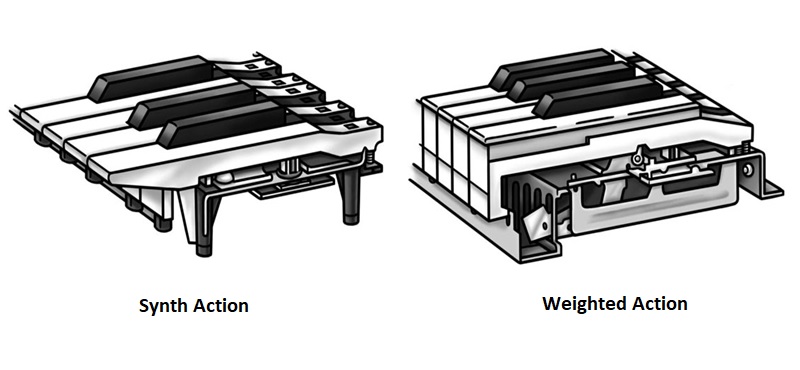
The piano action is one of the deciding factors for many, when choosing a piano. And similar to the various types of keyboard instruments, even the action can vary depending on the instrument. You’ll be in a better position to decide what sort of key action you need for your Digital Piano keyboard, if you have some basic understanding of the various types. Here’s a simplified explanation of Synth, Weighted, and Hammer key actions.
Keys: Important Factor
If you have ever seen experienced pianists talking about any keyboard instrument, one of the points that will definitely feature in their discussion is about the piano keys. Doesn’t matter how expensive or how cheap the instrument is!
And why is that so?
Because the keys enables a piano players to perfectly play the various nuances / dynamics of any song. If they are unable to play any song to the best of their abilities, very likely you will hear them blaming the keys.
The same applies to keyboard and synth players as well, who do not like very hard and very heavy keys.
But before we proceed further, do you know what Piano Action Keys are you looking for in the digital keyboard or piano that you intend to buy?
When it comes to the various keyboard actions available on musical keyboards and stage pianos, you will hear various terms like:
- Synth Action
- Weighted Action
- Hammer Action
- Graded Hammer Action
- Ivory Top Keys, and more
These terms simply indicate what type of keys you want for your digital piano keyboard.
I am sure you must have noticed that the pianos have thicker keys whereas most of the keyboards have thinner keys.
So Action basically refers to the feel of the instrument, the keys in particular.
Why So Many Key Actions?
The primary reason for so many key actions is to suit the different levels of keyboard and piano players.
Beginner keyboard players like synth action, whereas somebody who wants to learn the piano will prefer weighted action. Advanced piano players will prefer graded hammer action and so on.
When it comes to hammer and graded hammer actions, the manufacturers may also have their own unique way of naming them, just to suggest that their piano keys are the perfect and resemble the closest to acoustic piano keys.
Before you decide what sort of action you need, let us see what each of them stands for.
Synth Action Keys
A Synth action (spring loaded) is found in almost all the musical keyboards.
With a Synth action it is easier to play faster as the keys are lighter. It is basically made of plastic. Almost all the entry level 61-key keyboards have this action.
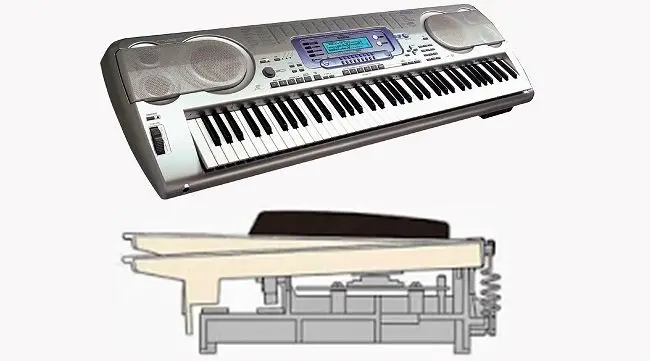
Spring loaded key action, commonly found on electronic keyboards
If you have been playing the Piano for some time then you may find this action a bit uncomfortable.
A lot of musicians, on the other hand, find this action suitable for playing the sounds of other instruments besides the piano. You can try it out at your local store to get its feel.
Weighted Action Keys
Here you will find the manufacturers trying to imitate a real piano action. Weights are added below the plastic keys to make them harder to play. This means that the feel is more like a Piano.
You will get a better piano feel with the Hammer action, which is an improvement over the Weighted Action as they actually use hammers inside. But they will usually cost more.
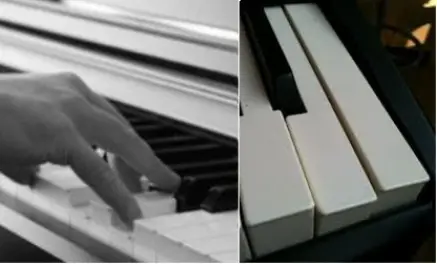
(Graded) Hammer Action Keys
In this case, the manufacturers actually use hammers inside the keyboard to strike a surface. The intention obviously is to get that perfect Piano feel. This action is far better than the weighted action and a lot of pianists actually prefer the Hammer action.
In graded hammer action, the keys are harder (offer more resistance) in the lower registers/octaves (so that you can play those pounding octaves) and become lighter as you go towards the higher registers/octaves (makes it easier to play those quick notes). This is how a real grand piano works; the hammers get thicker as you move to the bass side from the treble.
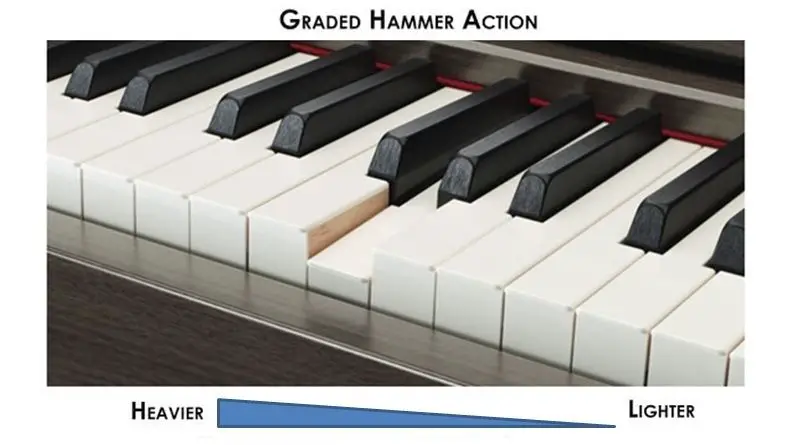
So a graded hammer action keyboard closely mimics the action on a real grand piano.
Anybody who plays on a hammer action piano should be able to play on almost any acoustic piano; they just have to spend some time on the acoustic piano and they will quickly get used to the keys.make some minor adjustments.
Experienced pianists (including concert pianists) practice on pianos with graded hammer action; anything less than that, they are not going to enjoy playing.
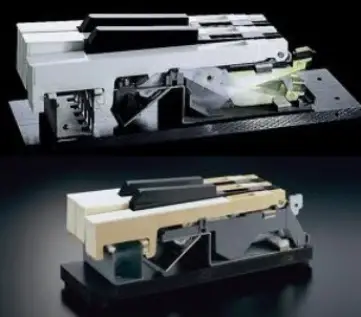
Most manufacturers advertise their products saying it comes with weighted hammer keys, but then most of the time, what you get is dependent on how much you spend.
Manufacturers of Digital pianos try to emulate the keys on an acoustic piano. On the more affordable digital pianos, they will use plastic keys with lead weights and a synthetic moving “hammer”. Students who have played on a musical keyboard (synth-action type) earlier will find such a weighted action piano better, as the keys are slightly softer compared to a piano with a proper hammer-action keyboard.
However, the top-of-the-line digital pianos use wooden keys with proper hammer action keyboard, and have a texture that closely resembles the real keys on ana acoustic piano. Several high-end digital pianos come with wooden-keys for added authenticity.

You will commonly see repair technicians swap the highest-octave key with the one which is somewhere in the middle (assuming that one is problematic). This is perfectly okay because on most digital piano models with weighted action, the weight is not really built in the keys, but in the keybed which has sensors to mimic the various key action (heavy, heavier, etc.). So it should be okay to swap the keys assuming one of the keys needs repair.
How Pros Use It?
Professionals own multiple keyboard instruments. So, any experienced keyboard player who makes a living out of this profession will usually have a piano with proper piano keys at home, and he/she will most likely have another keyboard instrument with a different key action to be used for gigs.
Even you would probably end up doing the same if you take that route.
Synth action (lightweight action) keyboard
- Suitable for playing fast lead lines
- Suitable for playing organ style
- Not very suitable for piano style of playing
Heavier weighted keyboard
- Good for playing piano and pads
- It can be an effort to play the lead lines, and even organ
If you want to do it all, then a good semi-weighted keyboard may sever the purpose and can be used for organ, synth and even the piano. You need to be experienced though, to use it well.
The various piano brands use different terminologies to denote their piano action. Here are some:
- Yamaha uses terms such as Graded Hammer Standard (GHS), Graded Hammer Effect (GH / GHE), Graded Hammer Effect 3 (GH3). Read more on Yamaha’s various actions – GHS, GH/GHE, GH3)
- Casio uses the term Tri-Sensor Hammer-Action
- Roland uses the term Progressive Hammer-Action Keyboard
- Kawai uses terms such as responsive or advanced hammer action
To Conclude
I hope this gives you some understanding of the various piano action found on keyboard instruments. Some may prefer hammer action, whereas certain style of playing may not be very easy with the weighted action (ethnic styles). Usually the proper weighted keys are suited for playing for piano, pads, and even good for lead lines. A light weight action is preferable for playing organ. Best is to try it out yourself and see if it suits your style of playing. You may even settle for semi-weighted keys.
If you are an absolute beginner, then most of the time the decision is quite simple. And since you may not have experience playing on different types of keyboards, you would be more or less happy to go with whatever is on offer for your budget. Either it will be a keyboard with thin keys or it will be a piano / 88-key keyboard with weighted keys.
However, the experienced players can face a dilemma, because they might be planning to upgrade to a higher model with important features, but they want a piano action that is familiar to them and gels with their style of playing. Trying out the piano personally is one of the best options to be sure about the piano action in such cases.
See Also
Please raise all your queries pertaining to the various piano keyboard actions, you may share suggestions too.
KeytarHQ editorial team includes musicians who write and review products for pianists, keyboardists, guitarists & other musicians. KeytarHQ is the best online resource for information on keyboards, pianos, synths, keytars, guitars and music gear for musicians of all abilities, ages and interests.



Do any portable Yamaha keyboards come with the GH3 keybed? I don’t need the wood keys (and the extra price) for a CP-4 but I do need the triple sensors. I can’t tell you how hard it is to get this information and help is needed. Thank you.